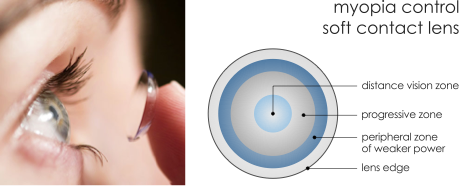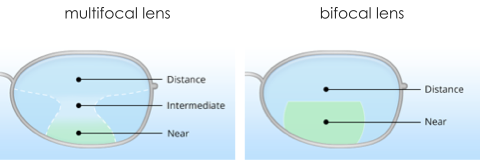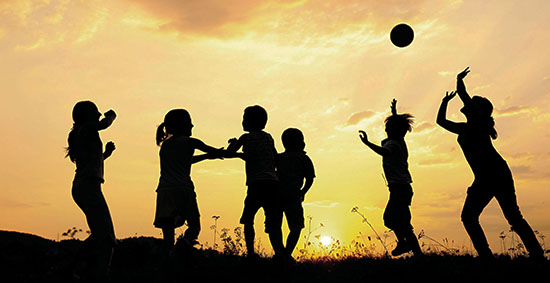Our optometrist starts with a detailed assessment of your child's eyes, analysis of their past and current eyesight changes, and with careful consideration of their age, family history and risk factors, we will decide with you on an individualised treatment plan to best manage your child's short-sightedness.
We graph your child's prescription changes to visualise their rate of myopia progression and to forecast their eventual level of myopia with different treatment options. And we will continue to monitor their progression closely while on treatment, to tailor and adjust the treatment plan for maximum myopia control.
The treatment options in our SightControl system are detailed below.
The treatment options in our SightControl system are detailed below.
ORTHOKERATOLOGY
Orthokeratology (Ortho-K or OK lens) is currently the most effective optical treatment for myopia control.
Ortho-K lenses are custom-designed rigid contact lenses worn during sleep. The lenses are made of a high-oxygen, breathable material and precision-shaped to fit your child's cornea so that gentle pressure is placed on the eyes at night to re-shape the corneal surfaces.
Our experienced Ortho-K optometrist uses a precision instrument called a corneal topographer to accurately assess and monitor minute changes in the shape of the eye.
Ortho-K lenses are custom-designed rigid contact lenses worn during sleep. The lenses are made of a high-oxygen, breathable material and precision-shaped to fit your child's cornea so that gentle pressure is placed on the eyes at night to re-shape the corneal surfaces.
Our experienced Ortho-K optometrist uses a precision instrument called a corneal topographer to accurately assess and monitor minute changes in the shape of the eye.
Non-invasive. Safe. Reversible.
This process of night-time corneal reshaping can be thought of as braces for the eyes. As well as controlling myopia progression, Ortho-K lenses will restore your child's vision which means glasses are not needed during the day and at school. That gives your child the freedom to participate in sport, swimming and all their other activities without the inconvenience of wearing glasses or daytime contacts.
Orthokeratology is an excellent option for kids with rapidly increasing myopia between -1.00 and -6.00.
Orthokeratology is an excellent option for kids with rapidly increasing myopia between -1.00 and -6.00.
ATROPINE EYE DROPS
Atropine eye drops is a medical treatment for myopia control with excellent results.
Atropine works in the eye to relax the ciliary muscle that controls lens focusing (accommodation). Simply put one drop into each eye before sleep, daily. The child continues to wear their glasses or contact lenses to correct their vision during their waking hours.
Atropine works in the eye to relax the ciliary muscle that controls lens focusing (accommodation). Simply put one drop into each eye before sleep, daily. The child continues to wear their glasses or contact lenses to correct their vision during their waking hours.
Easy. Next to no side effects.
For myopia control, a very low-dose concentration of just 0.01% atropine is used. Extensive clinical trials on children have shown little to no side effects or adverse reactions at this dosage.
0.01% atropine is considered safe for long-term use in children for myopia control, and is an approach that has also been advocated by paediatric ophthalmologists.
Our therpeutically endorsed optometrist can prescribe this treatment for your child, and the eye drops are prepared and dispensed by a compounding pharmacist. We can give you recommendations of compounding chemists able to prepare the low-dose atropine eye drops.
MYOPIA CONTROL SOFT CONTACT LENSES
Specific designs of soft contact lenses have demonstrated effectiveness for myopia control.
A myopia control soft contact lens, such as the CooperVision MiSight 1 Day, is a 'dual-focus' design with special peripheral optics that help reduce myopia progression by modulating eye growth.
The lenses are worn daily during waking hours, they are comfortable to wear and are a good option for children with milder myopia progression, and those not yet ready or not suitable for orthokeratology.
Please note that ordinary soft contact lenses do not produce these myopia control effects.
A myopia control soft contact lens, such as the CooperVision MiSight 1 Day, is a 'dual-focus' design with special peripheral optics that help reduce myopia progression by modulating eye growth.
The lenses are worn daily during waking hours, they are comfortable to wear and are a good option for children with milder myopia progression, and those not yet ready or not suitable for orthokeratology.
Please note that ordinary soft contact lenses do not produce these myopia control effects.
MYOPIA CONTROL GLASSES
Glasses are generally a less effective form of myopia control compared to the other options described above. However, for children who are less tolerant to contact lenses or atropine eye drops, or prefer to wear glasses, there are glasses lens designs which may still help.
We can prescribe multifocal or bifocal glasses that incorporate your child's distance vision correction with an additional reading power in the same lens. The reading power is designed to reduce their eyes' focusing (accommodation) demands when doing concentrated near tasks such as reading, homework, study and computer use, and help to relax their eyes' focusing muscles.
Multifocal and bifocal lenses are particularly effective for children with binocular eye coordination and near focusing issues. And for children showing myopia progression but wish to stay with glasses, we recommend these lenses over standard single vision lenses that provide no myopia control.
We can prescribe multifocal or bifocal glasses that incorporate your child's distance vision correction with an additional reading power in the same lens. The reading power is designed to reduce their eyes' focusing (accommodation) demands when doing concentrated near tasks such as reading, homework, study and computer use, and help to relax their eyes' focusing muscles.
Multifocal and bifocal lenses are particularly effective for children with binocular eye coordination and near focusing issues. And for children showing myopia progression but wish to stay with glasses, we recommend these lenses over standard single vision lenses that provide no myopia control.
ENVIRONMENTAL CHANGES
Recent studies have found strong evidence that inadequate exposure to sunlight contributes to the development of myopia. Kids who spend more time outdoors in the sun are more 'protected' against myopia. It is believed that regular exposure to bright sun light is linked to correct modulation of eye growth.
Environmental and behavioural changes may be beneficial in helping slow myopia progression, in conjunction with the prescribed optical or medical treatments above.
Spend at least 90 minutes outdoors each day.
Take regular breaks from near work.
Limit time on smartphones and tablets.
Take a 5 minute break every 30 minutes on a computer.
Limit intensive focusing tasks to 2 hours after school.
Maintain proper posture for all reading and writing.
Keep at least an elbow's distance from the page.
Always read under good lighting.
Everything we do is based on facts.
We believe in being transparent about what we offer for your children. Our treatment strategies are based on published peer-reviewed scientific research, which we are happy to share with you.
Find out more about our scientific approach to treating myopia.
Find out more about our scientific approach to treating myopia.
Book a myopia assessment for your child today.
Eyecare Concepts | The Myopia Clinic © 2017-23
KEW EAST | MELBOURNE
KEW EAST | MELBOURNE












